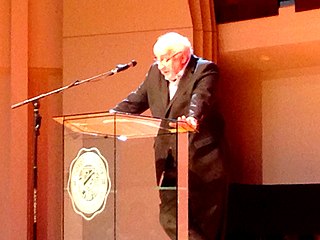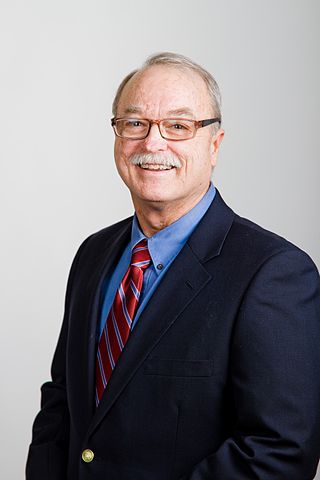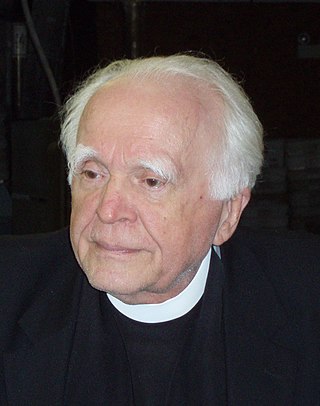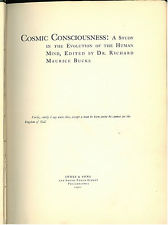Systematic theology, or systematics, is a discipline of Christian theology that formulates an orderly, rational, and coherent account of the doctrines of the Christian faith. It addresses issues such as what the Bible teaches about certain topics or what is true about God and his universe. It also builds on biblical disciplines, church history, as well as biblical and historical theology. Systematic theology shares its systematic tasks with other disciplines such as constructive theology, dogmatics, ethics, apologetics, and philosophy of religion.

Nicholas Paul Wolterstorff is an American philosopher and theologian. He is currently Noah Porter Professor Emeritus of Philosophical Theology at Yale University. A prolific writer with wide-ranging philosophical and theological interests, he has written books on aesthetics, epistemology, political philosophy, philosophy of religion, metaphysics, and philosophy of education. In Faith and Rationality, Wolterstorff, Alvin Plantinga, and William Alston developed and expanded upon a view of religious epistemology that has come to be known as Reformed epistemology. He also helped to establish the journal Faith and Philosophy and the Society of Christian Philosophers.

In the philosophy of religion, Reformed epistemology is a school of philosophical thought concerning the nature of knowledge (epistemology) as it applies to religious beliefs. The central proposition of Reformed epistemology is that beliefs can be justified by more than evidence alone, contrary to the positions of evidentialism, which argues that while non-evidential belief may be beneficial, it violates some epistemic duty. Central to Reformed epistemology is the proposition that belief in God may be "properly basic" and not need to be inferred from other truths to be rationally warranted. William Lane Craig describes Reformed epistemology as "One of the most significant developments in contemporary religious epistemology ... which directly assaults the evidentialist construal of rationality."

Richard John Mouw is an American theologian and philosopher. He held the position of President at Fuller Theological Seminary for 20 years (1993–2013), and continues to hold the post of Professor of Faith and Public Life.

James Porter Moreland, better known as J. P. Moreland, is an American philosopher, theologian, and Christian apologist. He is a Distinguished Professor of Philosophy at Talbot School of Theology at Biola University in La Mirada, California.

Stanley L. Jaki was a Hungarian-born priest of the Benedictine order. From 1975 to his death, he was Distinguished University Professor at Seton Hall University, in South Orange, New Jersey.

Wolfhart Pannenberg was a German Lutheran theologian. He made a number of significant contributions to modern theology, including his concept of history as a form of revelation centered on the resurrection of Christ, which has been widely debated in both Protestant and Catholic theology, as well as by non-Christian thinkers.
Edward John Carnell was a prominent Christian theologian and apologist, was an ordained Baptist pastor, and served as President of Fuller Theological Seminary in Pasadena, California. He was the author of nine major books, several of which attempted to develop a fresh outlook in Christian apologetics. He also wrote essays that were published in several other books, and was a contributor of articles to periodicals such as The Christian Century and Christianity Today.

Sergei Nikolayevich Bulgakov was a Russian Orthodox theologian, priest, philosopher, and economist. Orthodox writer and scholar David Bentley Hart has said that Bulgakov was "the greatest systematic theologian of the twentieth century." Father Sergei Bulgakov also served as a spiritual father and confessor to Mother Maria Skobtsova.
Nancey Murphy is an American philosopher and theologian who is Professor of Christian Philosophy at Fuller Theological Seminary, Pasadena, CA. She received the B.A. from Creighton University in 1973, the Ph.D. from University of California, Berkeley in 1980, and the Th.D. from the Graduate Theological Union (theology) in 1987.
Max Lynn Stackhouse was the Rimmer and Ruth de Vries Professor of Reformed Theology and Public Life Emeritus at Princeton Theological Seminary. He was ordained in the United Church of Christ and was the president of the Berkshire Institute for Theology and the Arts.

Cosmic Consciousness: A Study in the Evolution of the Human Mind is a 1901 book by the psychiatrist Richard Maurice Bucke, in which the author explores the concept of cosmic consciousness, which he defines as "a higher form of consciousness than that possessed by the ordinary man".
Carl Edward Braaten was an American Lutheran theologian and minister.
Graham John Ward is an English theologian and Anglican priest who has been Regius Professor of Divinity at the University of Oxford since 2012.
Theistic rationalism is a hybrid of natural religion, Christianity, and rationalism, in which rationalism is the predominant element. According to Henry Clarence Thiessen, the concept of theistic rationalism first developed during the eighteenth century as a form of English and German Deism. The term "theistic rationalism" occurs as early as 1856, in the English translation of a German work on recent religious history. Some scholars have argued that the term properly describes the beliefs of some of the prominent Founding Fathers of the United States, including George Washington, John Adams, Benjamin Franklin, James Wilson, and Thomas Jefferson.
William James Abraham was a Northern Irish theologian, analytic philosopher, and Methodist pastor known for his contributions to the philosophy of religion, religious epistemology, evangelism, and church renewal. Abraham spent most of his career in the United States and was the Albert Cook Outler Professor of Wesley Studies at Perkins School of Theology at Southern Methodist University. He previously taught at Seattle Pacific University and was a visiting professor at Harvard Divinity School. Abraham was associated with the Confessing Movement in the United Methodist Church and was a proponent of canonical theism, a church renewal movement that looks to the canons of the ancient ecumenical church as a source for renewing mainline Protestant churches.
Charles Stephen Evans is an American philosopher and expert on Søren Kierkegaard.

William T. Cavanaugh is an American Catholic theologian known for his work in political theology and Christian ethics.
Veli-Matti Kärkkäinen is a Finnish theologian. He is Professor of Systematic Theology at Fuller Theological Seminary. He is an ordained Lutheran minister and an expert on Pentecostal-Charismatic theologies.
Kelly James Clark is an American philosopher noted for his work in the philosophy of religion, the philosophy of science, and the cognitive science of religion. He is currently Senior Research Fellow at the Kaufman Interfaith Institute and Professor at Grand Valley State University in Grand Rapids Michigan.








